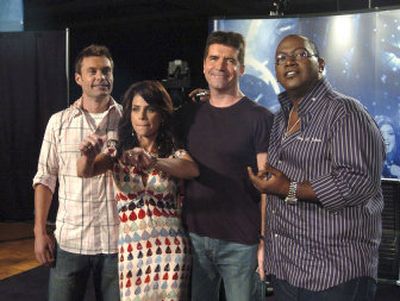‘Idol’ Statistics

“American Idol” seems to live in an alternate TV universe. Other shows fret about fading fans and drooping ratings. “Idol” did decline a bit last season, but can shrug it off.
“If we lost 50 percent of our ratings, we’d still be the No. 1 show,” producer Nigel Lythgoe says, exaggerating only slightly.
And as the effects of the writers’ strike snowballed, “Idol” has seemed immune.
“People say we’re going to have a bumper year,” Lythgoe says.
Other reality shows fear that a schedule overload will leave all of them seeming like rag-tag rejects.
“Idol,” however, has its place set: It was already No. 1, even when TV still had writers and scripts and choices.
The basic formula receives only slight tinkering:
•There will again be lots of airtime. That starts with two hours of auditions on both Tuesday and Wednesday of this week.
•The audition cities have changed slightly, as usual. This time, they were Atlanta, Charleston, Dallas, Miami, Philadelphia, Omaha and San Diego.
“Our best city, for this year, was San Diego,” Lythgoe says.
•The basic approach will shift a bit. There will be less attention to the mentors, Lythgoe says, and more to the contestants.
•The key people will remain the same: Ryan Seacrest as the host, Simon Cowell, Randy Jackson and Paula Abdul as judges.
•Still, the viewers get the final say about who wins. Then the public decides who has a big career.
Clay Aiken finished second and still put out hit records. Jennifer Hudson finished sixth and won the biggest prize of all – an Academy Award in her debut starring turn in “Dreamgirls.”
And Chris Daughtry finished fourth, then jumped to No. 1 on the Billboard charts. His debut album, “Daughtry” was the best-selling album of 2007, according to Billboard, selling a whooping 3.2 million copies.
Daughtry made his decisions perfectly, Seacrest says, mixing smart songwriting and a throaty, emotional style of rock music.
“Nickelback had that area to themselves until he came along,” says Seacrest.
Some actual “Idol” winners also became stars. Kelly Clarkson, the first champion, topped the pop charts; Carrie Underwood, the fifth, did the same in country.
“When we heard her voice, we knew she was something,” Seacrest says. “She looked beautiful; she sounded beautiful.”
When she won, he says, producers avoided any temptation to make her blandly pop. Instead, they introduced her to Nashville’s top talent.
Will this year produce fresh stars? Some of the judges have already called it the best crop of contestants ever.
“We’re all paid to say that each year,” Lythgoe jokes.
He does say, however, that there’s a fresh surge of young singers: “There are three 16- and 17-year-olds who are absolutely brilliant this year.”
Some people argue that last season’s lineup was so-so, creating the dip in ratings.
Lythgoe’s takes a two-sided view. He says last season:
•Had strong depth, throughout the top 12 and beyond.
“I wasn’t embarrassed by anyone last year,” he says. “Even young Sanjaya (Malakar) came through.”
•Failed to create a big stir for individuals at the top.
Lythgoe takes part of the blame for that. “Idol” was so busy focusing on its mentors – Diana Ross, Jon Bon Jovi, Gwen Stefani and others – that it didn’t give enough attention to the contestants; audiences didn’t feel emotionally involved.
This season, he says, “Idol” will spend plenty of time talking to the contestants. “We might even talk to their parents,” he adds.
The personalized approach sometimes draws criticism. Some contestants – Malakar, Aiken, Kellie Pickler – drew constant attention, building audience appeal; others were ignored.
Lythgoe insists that’s fair.
“If they’re boring … in front of the camera … they should be grateful for not being shown,” he says.
Besides, he argues, contestants can win without early attention.
“Jordin (Sparks) didn’t get any screen time,” Lythgoe says.
Neither, at first, did Clarkson. The quiet waitress from Dallas kept getting better, and won.
Sparks, a towering high school student from Arizona, became the sixth “Idol,” with her first album off to a so-so start.
Lythgoe describes her as “a young, fresh pop singer” who will catch on.
By the way, there will be another “Idol Gives Back” fundraiser this season. This time, it will get a night to itself with the elimination of a contestant being on a different night.
But there are no plans for another “World Idol,” pitting winners from individual countries.
Lythgoe says he wasn’t pleased with the first one: “Kelly Clarkson lost to a plumber from Finland.”